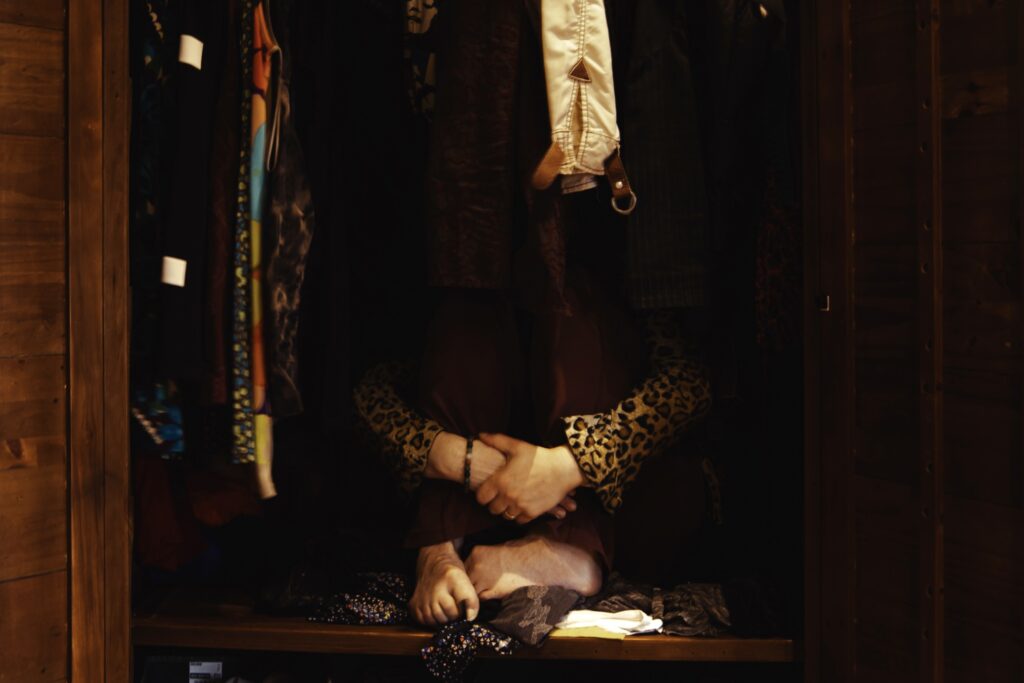
I am sorry to have been silent for so long. I have been away – sort of – and have been trying to find my way back home, and back to you, to the M/Others who Make (MWM) community, to those in the heart of it, and those just hanging round the edges. All of you.
You see something happened last year that changed everything.
However many times I tell the story, I can’t quite believe it happened, even though I was there, even though the tingling in my hands as I type this – my peripheral neuropathy – are evidence that it was real, it still shocks me, and I doubt it, as the children must have doubted Narnia, after they had climbed out of the wardrobe. I will tell it again now to affirm its reality, but a new version of it, that I haven’t told before, that I have been waiting to tell you – the MWM community – in particular.
To tell you this version, I need to go back a bit. Not just back in my life, but back almost a hundred years, to 1928. Back to Virginia Woolf saying:
“A woman must have money and a room of her own if she is to write fiction.”

As I have explained before now, I wrote my novel sitting on my children’s bedroom floor, while my husband was at work. My kids grew up referring to the parental bedroom in our house as ‘Daddy’s room.’ I was so frequently in their bedroom, settling and soothing them, that Mummy didn’t even have a share in a room, let alone having one of her own. Though this undermines Woolf’s claim it doesn’t entirely negate it, because I was still lucky enough to have access to the same ingredients that she named – money and space – they just weren’t mine alone. I was sharing them – the children’s room and Daddy’s cash – in a much more supportive climate than the one in which Woolf lived and worked.
However, a century later, the basic idea expressed in Woolf’s essay persists, which is that a life of care – of what was once called ‘women’s work’ – is antithetical to creativity, because it gives you little or no space of your own, and because it earns you nothing, or next to nothing. For over a decade now, through the founding and leading of MWM, I have been gently interrogating this idea: is it true? Do care and creativity have to be in opposition?
This time last year, having got the novel off the bedroom floor and out into the world, I started working on a new idea for a book – nonfiction this time. It was to be a culmination of the MWM work, of these blogs, a book about making in the midst of caring. We had just moved into a house that was, in theory, large enough for me to have a space of my own but I was exhausted, didn’t have the energy to unpack the boxes, and – although the children now had a bedroom each – I had only made it as far as the kitchen table. I hadn’t claimed anywhere else as mine.
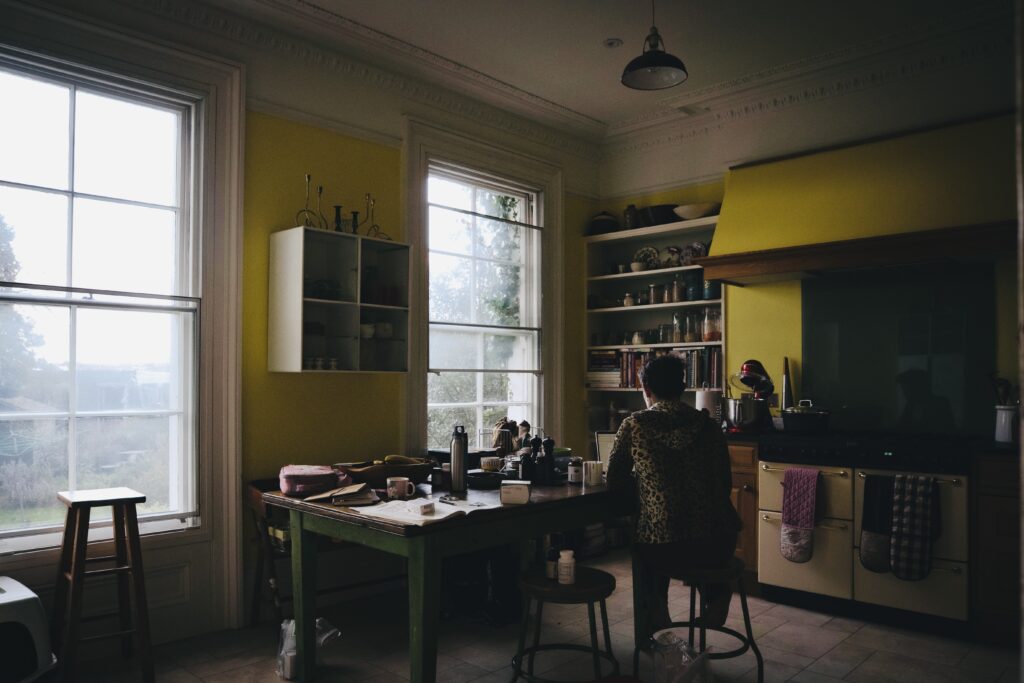
As I worked in the kitchen – often interrupted by my daughter being bored, or my son telling me about his worries – I was haunted by another quote, related to Woolf’s but very different, from Maya Angelou:
“Every person needs to take one day away.… Jobs, family, employers, and friends can exist one day without any one of us, and if our egos permit us to confess, they could exist eternally in our absence. Each person deserves a day away in which no problems are confronted, no solutions searched for. Each of us needs to withdraw from the cares which will not withdraw from us.”
Not a whole room. Not a load of money. Just a day, says Angelou. Just a slither of time. Everyone, she says, needs this. Not just women. Not just fiction writers. Every person. I loved this quote, but it also troubled me. I was quite happy to question Woolf, and to contest the entire foundation of our capitalist cultural narrative in which care undermines creativity, but I could not dismiss this challenge. It made me uncomfortable because – the truth is – I didn’t think I could do it.
My children are both autistic and both learn from home. In April last year they were 7 and 12, and Daddy had flown off to New York for six weeks – as he has done before – to direct a prestigious opera at The Met. This time the opera was The Hours inspired, as it happens, by Woolf’s life, death, and her novel, Mrs Dalloway. Meanwhile I was, as always, back home. I had not spent a single night away from the children since their birth. If I did have to go out for an afternoon, to work, it was a big deal – a formidable amount of preparation had to go into the event. Finding childcare was not straightforward – I had tried! – and I wasn’t at all sure my family could exist a whole day in my absence, let alone forever. “If our egos permit us to confess…” writes Angelou. Was this arrogance on my part? It didn’t feel like it – it simply felt well-nigh impossible to withdraw from my cares. Maybe Maya Angelou didn’t have kids with special needs, I thought, as I sat at the kitchen table – not withdrawing – but working on the draft of the book proposal about making alongside caring, feeling exhausted, but carrying on anyway. MWM had turned 10 and I was turning 50 at the end of the month, and I wanted to get this proposal done.
And then…
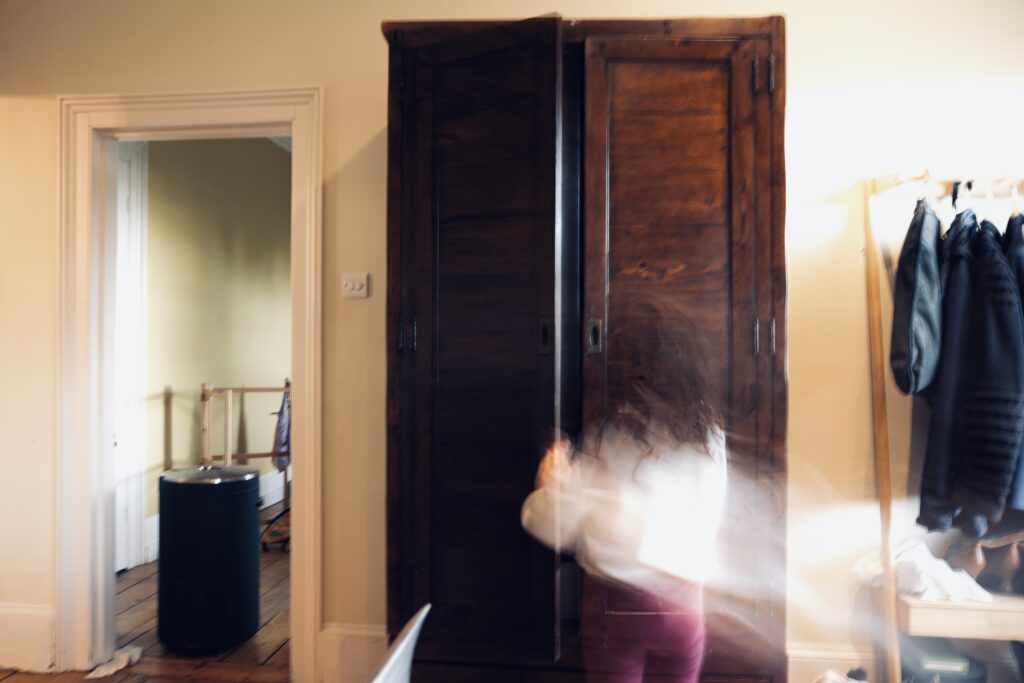
And then it happened. The something that changed everything.
It started with a birthday weekend full of candles – fifty of them, sent to me by friends and family, near and far, and set into our fireplace – a little installation of light to celebrate my fifty years. What followed was a routine blood test on the Monday morning. And what followed that was a total of fourteen and a half weeks in hospital, during four rounds of intensive chemotherapy, over six months. That’s – and this is the first time I have worked this out – exactly one hundred days and nights away from my children.
On day one, right after I was told I had Acute Myeloid Leukaemia, and that I needed to be admitted, I informed the doctor that wasn’t possible. For that night at least I needed to go home. I rang my husband in New York. While in the background the three female protagonists of The Hours sang about loneliness and love across time and space, I told him I had leukaemia. He booked a flight back to the UK. Virginia Woolf and her characters would have to sing their arias without him.
I did get home that night. Not till midnight, but I made it. My son hadn’t eaten. I managed, somehow, to get him to have some food and to support both children to sleep. I lay awake all night, next to my daughter, heart thumping as hard, harder, than if I were about to go on stage – that helped actually – the association of adrenaline with something creative.
And then, very early, before either child was awake, I left. My brother drove me back to hospital. I was admitted to the Lord North Ward, Oncology Centre, Maidstone hospital. I was given a bed in a bay with five other women. I was crying on and off most of that day. The nurse settling me, wanting to cheer me up, told me there was a silver lining to my being so ill, and to having such a severely compromised immune system.
“What is it?” I asked, desperate.
“You’ll get a room of your own,” she said.
And I did.
Room 1 was my room. First on the right as you came in through the ward. For a whole seven weeks, I never left it. During the second stay I got Room 8 – the largest. Then room 4, and last of all room 5. All rooms of my very own.

I had been writing about creating while caring for others. Now, suddenly, literally overnight, I went from being the carer, to the cared for. Other people made my meals, mopped the floor, changed my bedsheets. I had the kind of time, alone, that famous male artists have purportedly had throughout the centuries. I filled nine notebooks.
And the children? And my husband?
They survived. It wasn’t easy. At times it was brutally hard. But it was not impossible, as I had thought. Maya Angelou was right. They existed. Not just for one day, but for one hundred.
And yet, those hundred days and nights, and the nine notebooks, did not undermine my book project, or the commitment I had made through MWM to explore how care and creativity might be allies, not enemies. It deepened and affirmed it.
Because, I discovered, there is no such thing as a room of one’s own. Certainly, no such thing as an isolated space, removed from the rest of life. I did not stop caring – of course I didn’t – not for any of those days or nights. Modern technology helped. I sang my daughter to sleep over the phone. I WhatsApped with my son – probably fifty messages a day – to try to allay his terrible anxiety. I went online and ordered the groceries, and the cat litter, to come to the house in my absence. At mealtimes, I messaged my son a list of menu options. He told me what he wanted. I relayed his order to my husband or the heroic granny – my octogenarian mother- who had come to stay to help my husband.
But still.
Still, whole weeks went by when I did not see or hold them – those children.
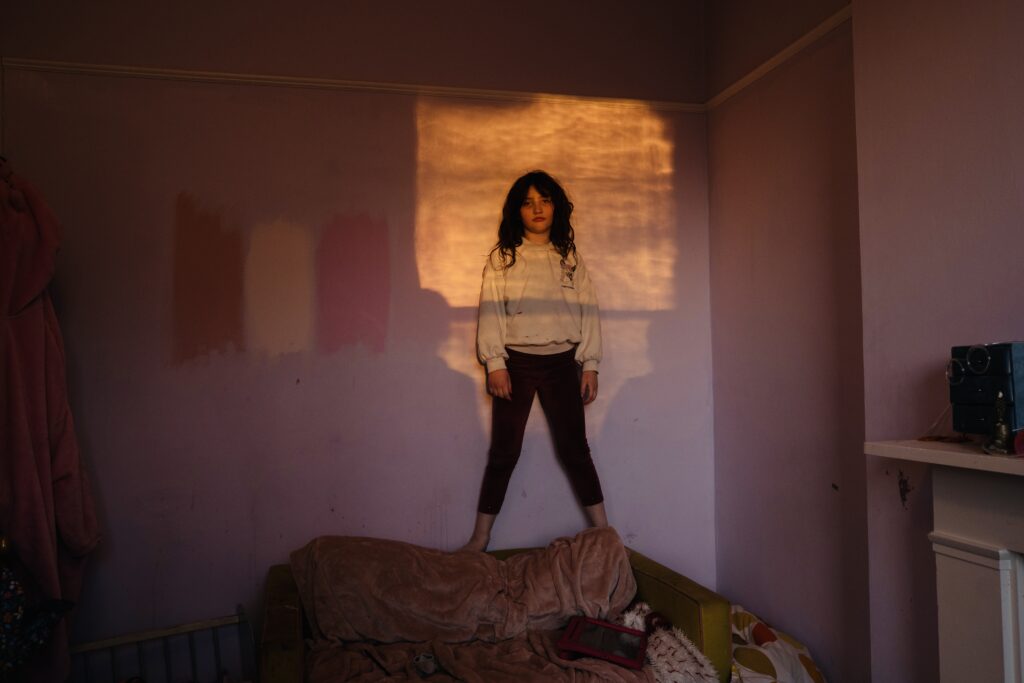
Yet they managed. I managed.
It wasn’t, however, only the sustaining of my caring responsibilities long distance that made my solo room into a communal one. It was also the strong, deep sense I had during that time, that care is always, in some measure, reciprocal and that I was enmeshed in a great and intricate web of the stuff – of care – in that room on my own. Because as the nurses checked my pulse and temperature, I asked them how they were, and they told me their stories – the one who was living by herself after a break-up, the one who was leaving soon to go to Australia. Because I was brought bags of deep red blood from strangers, whom I would never meet, which coiled into my veins, and kept me alive. I felt it, saw it, everywhere, this reciprocal, complex network of care – in the air I was breathing; in the rain, falling into the hospital courtyard outside my window; in a blackbird I heard there; in the chemotherapy, caring for me, even while it indiscriminately killed my blood cells; even the leukaemia, in some strange way was part of it. The world seemed shot through with it – it was not just something a nurse did to me, or I did to the children. It was more like a law of physics. More like a work of art. Almost impersonal and yet impacting each of us – my bones, my blood, the children back home, the blackbird too. Rain to earth. Nurse to patient. Birdsong to ears. And the other way around. Me to the nurse. Ear to birdsong. Earth to rain. And on and on, bouncing off each other. A theory of relativity, of relations, across time and space, such as the The Hours dramatizes. We were all winking and blinking at each other, as the candles in my birthday fireplace had done. We were all leaning in, conversing, caring.
Which is difficult to remember as I sit back at the kitchen table, in remission now, trying to find a way to enter life again within a world that seems to get more hostile and terrifying by the day. But it is more vital to remember it – this network of care, a fabric we are part of. Rooms, time alone, and money – these are incredibly valuable resources, but they are not, I would say to Woolf, the prerequisite for fiction-writing or any other kind of creative practice. If anything is essential, I would argue it is the points of connection between us, between everything, the ability to give another our attention, the moments of listening, of leaning in, of taking care. That is what kept me alive. That is what helps me write – the last book, and the next one. And the next. And this, to you, now.
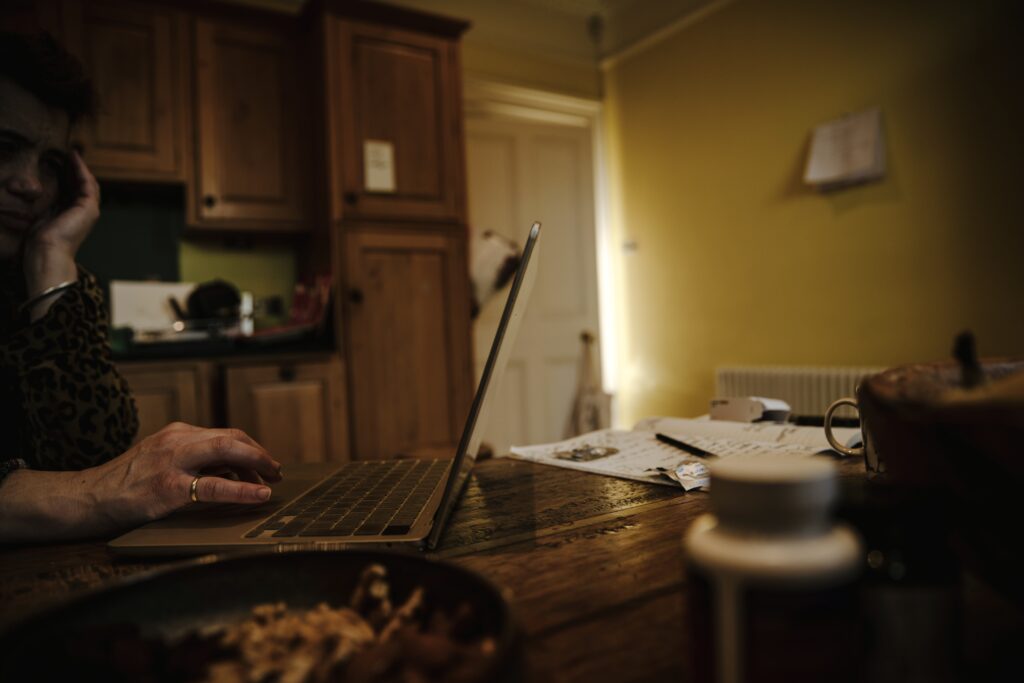
It might seem odd to compare my time away in hospital, grappling with a life-threatening illness, to stepping into a magical land through the back of a wardrobe, that Narnia and cancer treatment don’t have much in common. But there are definitely similarities. Both entail entering a mythic space, and it is difficult, on returning to the everyday, to know how to bring back the experience from that other place, other state. As ever, writing helps, and with it what I am trying to say out loud here – the knowledge that Narnia/ the mythic is not actually somewhere else. It’s here. With us all the time. I think Woolf was saying this in Mrs Dalloway. I think Maya Angelou’s challenge, to withdraw for a day, is about stepping back, so that we might see it again. In fact, I am starting to believe that this other mythic world is one and the same as the web of care I have been describing. My fizzy fingers – the nerves damaged by the high doses of chemo I received – agree. I have brought them back with me, from within the wardrobe, from Room 1 Lord North Ward, Maidstone, as a souvenir. I can sense the intricate filaments inside my hands that enable me to feel, to touch – they are like a cross between frost creeping across a window, and the buzz I imagine a tree might feel as it is about to bud- a hundred sharp little lines, living patterns, inside me, the stuff that Narnia is full of in winter, in spring, the stuff our bodies, this world is full of, if we can only notice it.
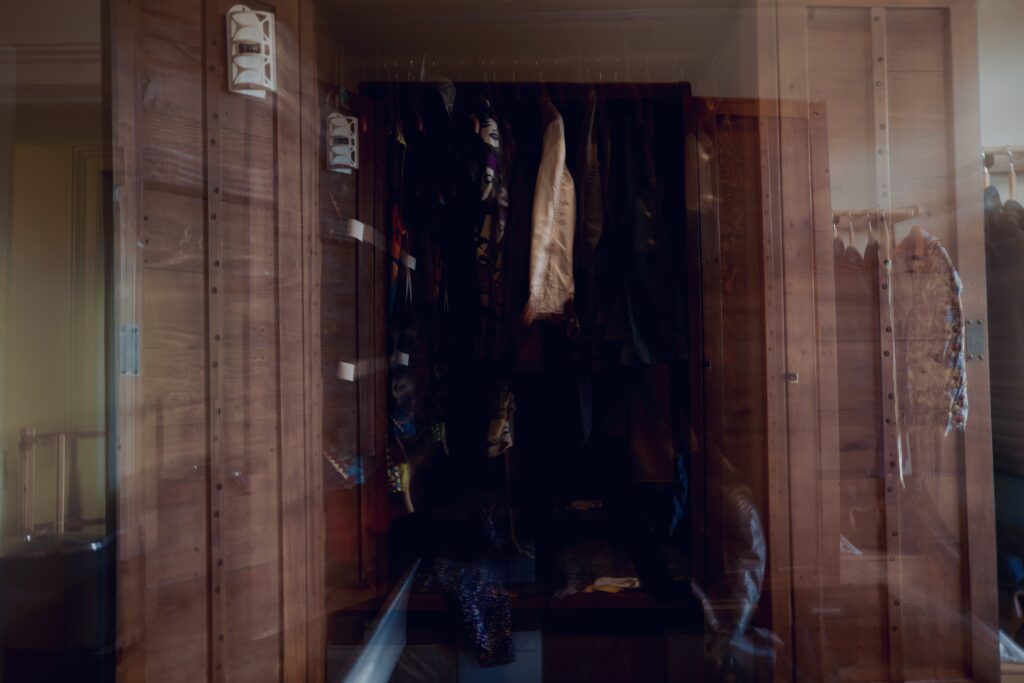
Care is thought of as mundane, as the antithesis of mythic. But look closely, closer still, and in the fine weave, they meet, meld. I promise you, doing the dishes can be a source of meaning. Which is not to say that you aren’t allowed to feel bored, frustrated, resentful while you do them – those things are meaningful too, also part of the weave. Because care so easily becomes a burden, and not a source of support or creativity, in a culture that doesn’t value it.
So, with this simple, radical insight, I am slowly coming back.
We are going to relaunch MWM soon – not that it ever stopped, because it too – like the children – can exist perfectly well in my absence and did, (special thanks due to Rebecca J Burman for sustaining the online peer support meetings without me, and to everyone else who has carried on MWM this year). But we are going to launch again, more gently, more carefully, with a forward slash in our name – M/Others who Make -and six months of creative workshops, one a month. More info to follow soon enough, but the workshops will involve expanding and deepening the conversation, around how we create, with or without a room, with or without money, but always, and forever, with a sense of care. Watch this space….
All images by Mika Rosenfeld: https://mikarosenfeld.co.uk
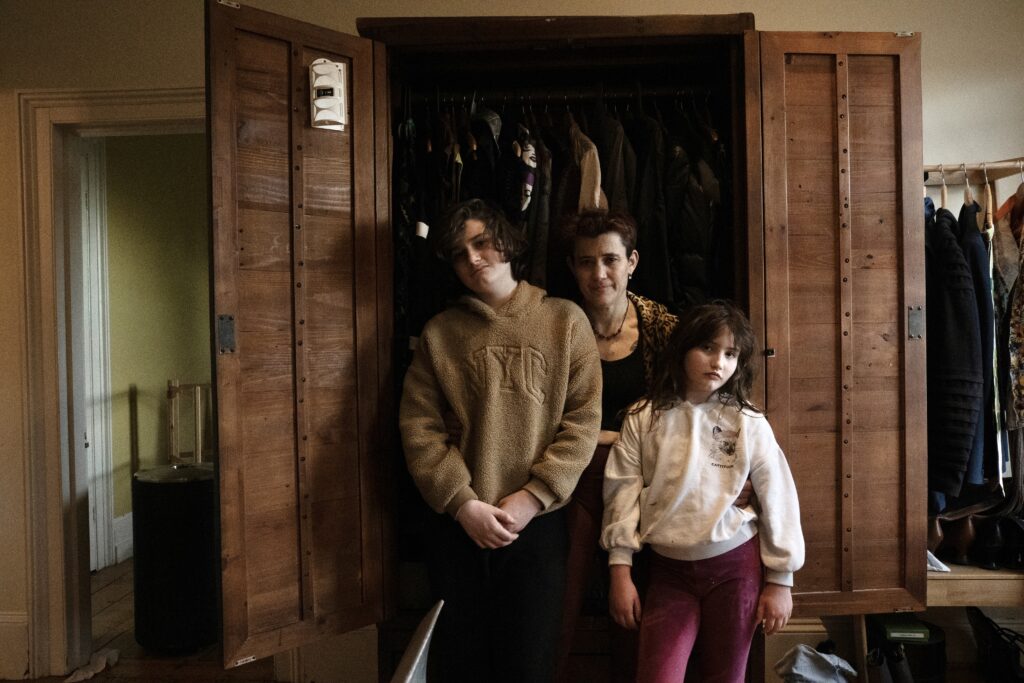

Unbelievably beautiful and so profound I feel like I swam within these waters. The last photo of you all just made me weep.
Weep because here you all are ! At the summit with the snail trail glistening marking the path you trod, slimed , inched up !
Thank you my dear xxx
So honest and articulate. Thank you for sharing and for ‘caring’. All love x
Thanks Liam. Hope your own journey with it all is leading you somewhere meaningful, or rather where you can set about whatever meaning-making you need now. Much love xxx
I am amazed, shocked, frightened for you and so relieved you are present and getting well once again.
You are a true force of creativity Tilly. I’m honestly so sorry you all had to endure this, but of course you managed to find a miracle in the lesson you absolutely shouldn’t have had to learn.
Love and empathy x
Thanks Emma. I think I definitely needed to learn those lessons !!! but thank you for your very kind words. xxx
Thank you so much for these reflections. I have found this piece of writing truly inspiring and profoundly moving. I have been thinking of you often over these past months and I am very happy and relieved to learn that you have been to Narnia and back.
Thank you Celia. Much love to you. xxx
First of all can I say how incredibly brave and strong and resourceful you have been. Sending you big hugs.
Thank you for your words which have resonated so much for me today, coming back from breast cancer, children now late teens and older and a worrying sense of “ What am I actually here for now?” They’re still at home currently and yesterday the house was empty and I was so productive preparing for an art fair I’m taking part in tomorrow. It’s the start of a new era as the youngest leaves school and I have to remind myself “ Just show up everyday and see what happens.”
Thank you for this and yes, yes, YES – that’s the practice, always, though it feels like it’s getting both more interesting and more vital this side of illness – to show up every day and see what happens. Much admiration back to you.
Am sending much love and nods of recognition towards you. I’ve never acknowledged the links you set out above – reading them has helped me in this moment.
Curiously Bumshuffling with you as you re-emerge. Xx
Sending love back to you. Bum shuffling is an under estimated form of locomotion xxx
Beautiful, Matilda. Sending love x
I am quite simply delighted to once again read your words and hear them in my head & my heart!
As a fellow fizzy-fingered-feeler (my toes also take part in this ‘fun’) and someone who has also taken the ‘opportunity’ of cancer to re-shape my creative life, your words resonate incredibly deeply.
As a sender of candles, I’m just so happy to know you’re in remission, it is the very best news!
Love to you – and to P & the wee ones ❤️ॐ
Thank you Ian. Glad to know we share this fizzy-fingered experience of coming through an illness and the gifts it can bring xx
Hi Tilly I haven’t seen you in years but funnily enough I am listening to your audiobook at the moment and then your FB post came up today! I hope you are in the mend and so glad you are with your husband and children again.. Your book is absolutely wonderful and your voice reading it too. I am in awe! Well done and yes to keeping being creative. Lots of love Sophie (Avigdor)
Thank you Sophie. Lovely to know my book is still out there, finding its quiet way to the right people and very glad you are one of them. xxx
Dear Matilda,
So grateful for your words, your work, your soul, your care, your recovery and your continued presence in this corporeal realm.
Phil x
Thank you Phil. Likewise, very glad to know you and Fern are out there, doing what you do and caring in the way you care xxx
It’s Katherine the American, from WhatsApp forever ago! I can’t really believe what I’m reading, and I don’t know what to write- I was swamped by life (I guess?), and feeling like I didn’t understand British Acronyms, so I took a break from the group. I’ve missed it. My daughter is now running on the couch and looks not entirely unlike yours. Mathilda, I am so sorry. I just can’t believe some people’s paths. Why on earth was this one yours. But what you made out of it anyway. I think you have all the wisdom in the world now. I want to say, I wish you sincerely, every ounce of happiness and peace and love and creativity and community you can get. And so much childcare. I wish that for you! You have given us all So So So much. Peace be with you and yours!
Dear Matilda, thank you for sharing this in the generous and open way that I have come to learn is typical of you! What a total shock to your system. It is amazing, though again I realise to be expected , that you have found the creativity in something so dark. Wishing you continued strength for your recovery and hope to see you soon. Love to all the family. Helen xx
Dear Matilda thank you so much for this. I already stood in admiration of your shitty year, but you have of course found its beauty and its lessons. Having taken a guilty-ish day today to just be with my girl and not respond to demands from elsewhere I feel the complex truth of this. It isn’t always quiet we need but connection that lets us be who we need to be for a beat, or a lifetime. Sending love and thanks for your shimmering wisdom xx
Exactly. Thank you for reading and for understanding. And enjoy your day away! Much love xxxx